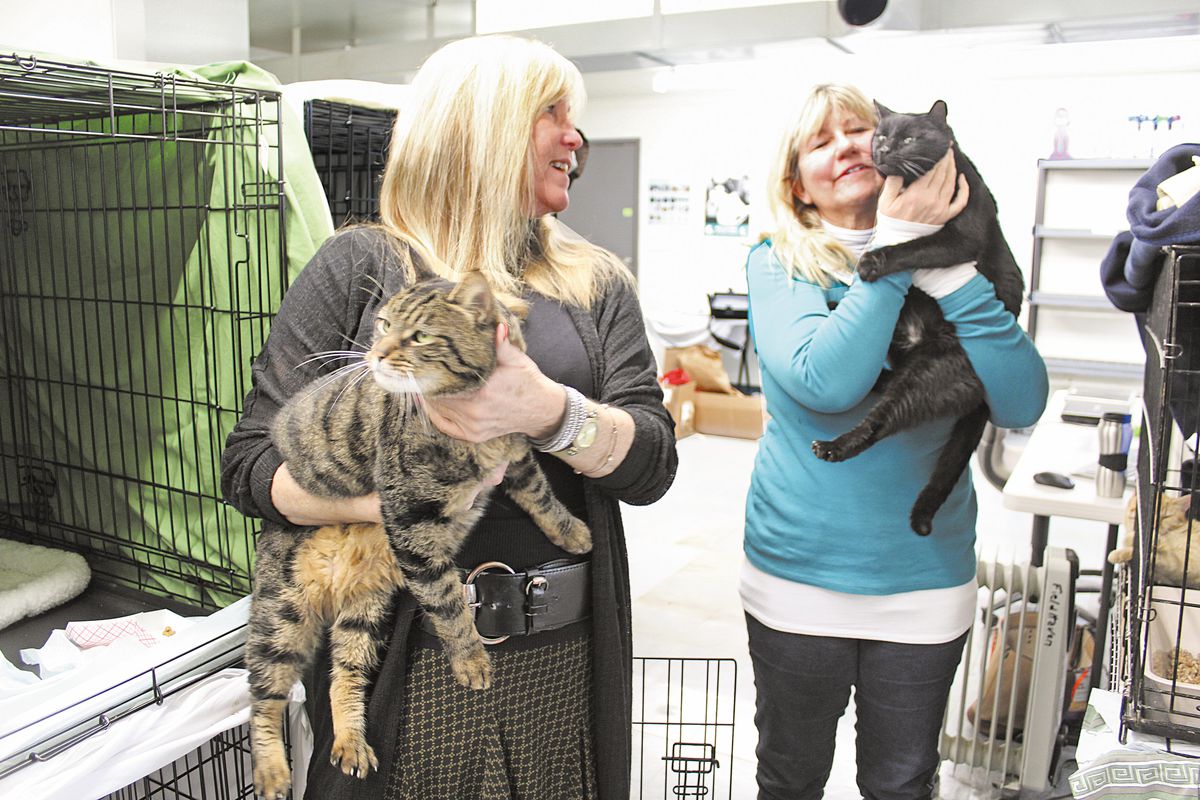
Photo by Meredith J. Cooper
Heidi Schwartz (left) holds a cat trapped at 141089 Temple Circle in Magalia on Feb. 22. Joy Smith, who heads FieldHaven Feline Center in Lincoln and opened the Transfer Station in Paradise to help Camp Fire pets, holds one trapped Feb. 23 at 5700 Woodglen Drive in Paradise.
On the morning of Nov. 8, Abigail Lopez and her boyfriend were packing a few essential belongings when she opened the back door and one of her cats, Friday, slipped out.
“He was scared—the sky was black, and we were scared and he was reacting to that,” she recalled. They were able to pack up their two other cats, a dog and a bird. The cockatiel, she said, died a month later, presumably due to the smoke inhalation and stress. Despite their house being saved by a neighbor, Stewart Nugent (see “Lonely living,” Newslines, Jan. 3), they have yet to locate Friday.
After the evacuation order was lifted for her portion of central Paradise, Lopez started heading up the hill regularly to check on the house—and to search. In January, she decided to help others in her situation, and started volunteering with the FieldHaven Feline Center, based in Lincoln, whose efforts continue to focus on the large number of cats that are still roaming the Ridge.
Despite what Lopez characterizes as a well-run operation, FieldHaven—and other independent groups like it—have faced pushback from local government. Executive Director Joy Smith says she’s had her methods as well as her motives questioned, despite having worked in animal welfare since opening FieldHaven in 2003.
On the flip side, Smith and others—including Heidi Schwartz, who volunteered with the North Valley Animal Disaster Group (NVADG) when the Camp Fire hit and has since joined Smith—charge that the government-run animal response has fallen short and that independent groups needed to jump in and help. They also contend that the messaging going out to the general public is that the job is done, since NVADG closed down the animal shelter at the airport on Jan. 4. That’s far from the truth, they claim.
“It’s been four months since the fire, and we are a long ways from being done,” Schwartz said during a recent interview at FieldHaven’s Paradise headquarters on Clark Road, dubbed the Transfer Station.
“Some people are trying to say there are no animals left out here,” Smith added. “Last week, we trapped three that were chipped—and all of them have gone home.”
Inside their warehouse shelter, about 40 cats rested in cages. Others have been transferred to a shelter in Marysville. The more social ones poked their noses out, while the shy ones—some of them feral—preferred to curl up in a back corner. It can be difficult to tell the difference between pets and ferals, Smith explained, because the pets still up there have been traumatized.
Jen Robbins was at work as animal control supervisor for the town of Paradise when the fire hit. She remembers immediately loading all the animals in their care into a van to be transported down to Chico. Then she and her staff spent the rest of the day trying to help animals—and humans—to safety.
Their facility didn’t burn, though it had no electricity or running water for several weeks after, so they worked alongside the NVADG volunteers rescuing injured pets, doing welfare checks for people with pets whose homes were standing. In many instances they “sheltered in place,” meaning they offered food, water and other necessities without trapping all the animals they found.
Once the evacuation orders had been lifted, Butte County told NVDAG to “stand down,” said Norm Rosene, the nonprofit’s vice president. The animals left were transferred to existing shelters throughout Butte County.
“Our frustration with other groups is they didn’t work within the system,” Rosene said. Meaning, they didn’t always keep proper logs of where animals were trapped or where they were currently located. Some—FieldHaven included—have moved animals out of the county, “making it harder to reunite people with their animals.”
Robbins agreed. “We don’t want to stop you from helping us, we just want you to work within the protocol,” she said.
Schwartz said she left NVADG because of the county’s system, which she said was chaotic and ultimately led to frustration for people trying to find their beloved pets. Without a centralized website, people waited hours to look at thousands of animals at one of four locations. Rosene countered that the group had put together a website, but with so many other groups compiling information, it was too difficult to maintain. They stopped updating it on Friday (March 1).
“Did it always run smoothly? No,” Rosene acknowledged, with the caveat that no one had predicted a disaster on such a large scale. “Did we lose [track of] some animals? Yes.”
Smith, Schwartz and volunteer Lopez have been trying to track down several cats they say went missing from Paradise Animal Shelter. Thirteen had been euthanized, they say. Robbins said those cats had tested positive for various communicable diseases and that they were all feral.
Going forward, everyone agreed they’d like to work together, though the obvious animosity could get in the way. Schwartz is planning a large-scale display at the Chico Mall for after St. Patrick’s Day, where she hopes to include photos and information of every animal still displaced to facilitate reunifications. Those are still happening daily, she said.
“There was a 70-something-year-old man who came in on Saturday and found one of his cats,” Smith said. “The tears came rolling down his face. That’s why we do this.”
